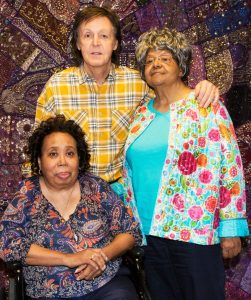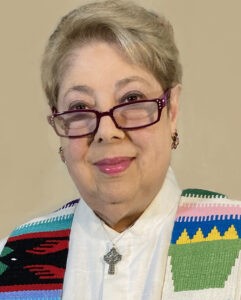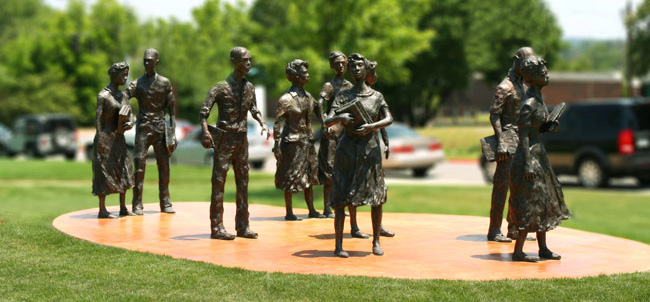McCartney revealed that he wrote the song with a specific issue in mind: Civil rights in the United States in the 1960s, specifically pointing to Little Rock, Ark., the home of Little Rock Central High School. The school made history by becoming the first desegregated high school in the Southern United States. Initially only a handful of Black young people tried to attend. Dealing with intense racism and violence throughout their struggle, these students became known as the Little Rock Nine.

Paul McCartney with Thelma Mothershed Wair and Elizabeth Eckford of the Little Rock Nine on April 30, 2016, at the Verizon Arena in Little Rock. (Photo via MPL Communications Ltd/MJ Kim)
In a poignant moment during a 2016 concert at the Verizon Arena in North Little Rock, McCartney revealed more detail about his inspiration for the song. When he introduced “Blackbird“ that night, he passionately said to the audience: “Way back in the sixties, there was a lot of trouble going on over civil rights, particularly in Little Rock. We would notice this on the news back in England, so it (Little Rock) is a really important place for us, because to me, this is where civil rights started.”
That night, two members of the Little Rock Nine, Elizabeth Eckford and Thelma Mothershed Wair, were in the audience. Almost 60 years after they claimed their place in American history books, they met Paul McCartney backstage and were in the crowd to watch him dedicate “Blackbird“ to them.
From his home in England, “we would see what was going on and sympathize with the people going through those troubles,” McCartney said, “and it made me want to write a song that, if it ever got back to the people going through those troubles, it might just help them a little bit.”
Yes, I was a Beatles fan, but this story about Paul McCartney caught my attention because I have met Elizabeth Eckford and Thelma Mothershed Wair, as well as the other courageous ones known as the Little Rock Nine. One of the nine, Minnijean Brown-Trickey, is a dear friend who worked with me to empower girls in Little Rock. So I learned first-hand about the fear, pain and disrespect Minnijean experienced just for trying to get into her new school. Most people have a number of heroes. Minnijean Brown-Trickey is one of mine.
“Let me encourage you to keep trying, to keep your faith, there is hope.”
McCartney’s message is one we need to take into our lives. These days, of course, are not known as days of the civil rights movement, but we would be disingenuous if we did not admit that our current times are most definitely days when the hostility around civil rights continues — women’s rights, reproductive rights, voting rights, religious freedom, human rights. The list increases, exacerbated, I believe, by the pandemic we lived through.
Most people acknowledge that nothing is the same after our long season of pandemic. The COVID virus and its variants still infect us, but we no longer live in the pandemic environment. The pandemic still has a hold on us because, even now, we are putting our lives back together. We are “repairing the ruined cities,” as in Isaiah 61:4. We are recreating our communities, putting families back together, businesses back together, schools, health care institutions, churches.
As we do this restorative work of embracing a very new normal, political rancor is all around us, and with it disunity, disrespect, division, broken trust, meanness, greed — general societal disturbance. It is all incredibly disconcerting, and there are no easy answers.
Many people in these current times sense crisis surrounding them in many areas. Many feel broken personally, inside where broken spirits struggle for restoration. Yet, even with proverbial “broken wings,” people of faith have learned anew how to “fly,” in spite of their brokenness.
“As people of faith, we are called, above all else, to refuse to give up on what is good and right.”
Perhaps the soundest advice we could receive is simply this: “Don’t give up.” As people of faith, we are called, above all else, to refuse to give up on what is good and right. We are a persistent people who, at our best, confront the evils that threaten to destroy our lives in community. At our best, we join the battles that need to be fought to restore decency and unity in our communities, our nation and the world.
Joining in the battles that need to be fought, faith communities will always find an extra measure of courage to keep trying and to “press on toward the goal, toward the prize of the heavenly call of God in Christ Jesus.” As we persevere in recreating and reviving our politics, our schools, our churches, our communities, our families and our very lives, may we draw courage from the words Paul McCartney wrote during a crisis of another time: “Let me encourage you to keep trying, to keep your faith, there is hope.”
McCartney also empowered suffering people in troubling times with other words, maybe words for our times, too: “Take these broken wings and learn to fly!”

Kathy Manis Findley
Kathy Manis Findley is an ordained Baptist minister with Greek Orthodox roots. Now retired in Macon, Ga., she spent her 38-year ministry serving as a pastor, hospital chaplain, trauma counselor and missionary to Uganda. She is a graduate of Southern Baptist Theological Seminary and is certified in victimology, trauma intervention and child forensic interviewing. She is the author of two serious books, Voices of our Sisters and The Survivor’s Voice: Healing the Invisible Wounds of Violence and Abuse, and just for fun, one Kindle novel.
Related articles:
White America has been lying to itself about who we really are | Opinion by Laura Mayo
Racism and the evolution of Protestant support for private education | Analysis by Andrew Gardner

